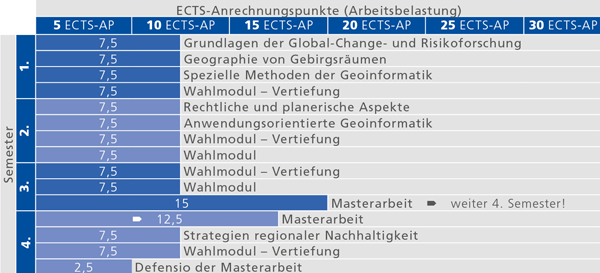Masterstudium Geographie: Globaler Wandel – regionale Nachhaltigkeit
Curriculum (2007W)
Ab dem Wintersemester 2015/2016 darf eine Zulassung zu diesem Studium nur nach dem neuen Curriculum erfolgen.
Master of Science
Dauer/ECTS-AP
4 Semester / 120 ECTS-AP
Studienart
Vollzeit
Unterrichtssprache
Deutsch
Voraussetzung
Fachlich infrage kommender Bachelorabschluss oder Äquivalent und Sprachnachweis
Fakultät
Fakultät für Geo- und Atmosphärenwissenschaften
Niveau der Qualifikation
Master (2. Studienzyklus)
ISCED-11: Stufe 7, EQR/NQR: Stufe 7
ISCED-F
0532 Geowissenschaften
Studienkennzahl
UC 066 855
* Informationen zum Curriculum (2007W)
Die Gesamtfassung des Curriculums spiegelt das aktuell gültige Curriculum wider, ist rechtlich unverbindlich und dient lediglich der Information. Die rechtlich verbindliche Form des Curriculums inkl. etwaiger Änderungen finden Sie in den entsprechenden Mitteilungsblättern.
Die Information, welche Curriculumsversion für Sie gilt, entnehmen Sie bitte Ihrem Studienblatt
abrufbar unter: https://lfuonline.uibk.ac.at/public/lfuonline_meinestudien.studienblatt
Spalte: Curriculum in der geltenden Fassung
Voraussetzung
Fachlich infrage kommendes Bachelorstudium an der Universität Innsbruck:
- Bachelorstudium Geographie
- Bachelorstudium Geo- und Atmosphärenwissenschaften
Kriterien zur Feststellung der Gleichwertigkeit:
Auch bei Abschluss eines anderen fachlich infrage kommenden Bachelorstudiums ist die Zulassung zu diesem Masterstudium möglich. Im Rahmen der Feststellung der Gleichwertigkeit wird jedenfalls die Absolvierung folgender Kernbereiche im Rahmen des abgeschlossenen Bachelorstudiums geprüft:
- 7,5 ECTS-AP aus dem Kernbereich Geographische Informationstechnologie/-systeme
- 7,5 ECTS-AP aus dem Kernbereich Physische Geographie
- 7,5 ECTS-AP aus dem Kernbereich Humangeographie
Sollten auf die Herstellung der Gleichwertigkeit nur einzelne Ergänzungen (maximal 30 ECTS-AP) fehlen, kann die Zulassung mit der Auflage von Prüfungen, die im Rahmen des Masterstudiums zu absolvieren sind, verbunden werden.
Informationen zum Studium
Empfohlener Studienverlauf
Der unten angeführte, exemplarische Studienverlauf gilt als Empfehlung für Vollzeitstudierende, die das Studium im Wintersemester beginnen. Die Aufstellung dient der Darstellung eines möglichen Studienablaufs und ist nicht verpflichtend. Etwaige Prüfungswiederholungen bzw. deren studienzeitverzögernde Wirkung sind nicht berücksichtigt.
Die Regelstudienzeit beträgt 4 Semester bzw. 120 ECTS-AP, wobei gemäß Universitätsgesetz die Arbeitsbelastung eines Studienjahres 1.500 (Echt-)Stunden zu betragen hat und dieser Arbeitsbelastung 60 Anrechnungspunkte zugeteilt werden (ein ECTS-Anrechnungspunkt entspricht einer Arbeitsbelastung der Studierenden von 25 Stunden).
7,5 ECTS-AP: Grundlagen der Global-Change- und Risikoforschung
7,5 ECTS-AP: Geographie von Gebirgsräumen
7,5 ECTS-AP: Spezielle Methoden der Geoinformatik
7,5 ECTS-AP: Vertiefung Wahlmodul
7,5 ECTS-AP: Rechtliche und planerische Aspekte
7,5 ECTS-AP: Anwendungsorientierte Geoinformatik
7,5 ECTS-AP: Vertiefung Wahlmodul
7,5 ECTS-AP: Wahlmodul
7,5 ECTS-AP: Vertiefung Wahlmodul
7,5 ECTS-AP: Wahlmodul
15,0 ECTS-AP: Masterarbeit › weiter 4. Semester!
› 12,5 ECTS-AP: Masterarbeit
7,5 ECTS-AP: Strategien regionaler Nachhaltigkeit
7,5 ECTS-AP: Vertiefung Wahlmodul
2,5 ECTS-AP: Defensio der Masterarbeit

Erweiterung des Studiums
Im Rahmen dieses Studiums kann das Erweiterungsstudium Entrepreneurship im Umfang von 45 ECTS-AP oder das Erweiterungsstudium Informatik im Umfang von 60 ECTS-AP absolviert werden. Die Zulassung zur Erweiterung setzt die Zulassung zu einem oder den bereits erfolgten Abschluss eines ausgewählten Studiums voraus. Weitere Informationen sind abrufbar unter:
Informationen zur Prüfungsordnung inkl. Bewertung und Benotung
Prüfungsordnung
Die Prüfungsordnung ist integraler Bestandteil des Curriculums, detaillierte Informationen finden Sie unter dem Paragrafen Prüfungsordnung.
Bei der Notenverteilungsskala handelt es sich um die statistische Darstellung der Verteilung aller positiv absolvierten Prüfungen, die innerhalb eines Studiums bzw. eines Studienfaches (unter Heranziehung aller gemeldeten Studierenden eines Studiums bzw. eines Studienfaches) erfasst wurden. Die Notenverteilungsskala wird in regelmäßigen Abständen aktualisiert.
| A | B | C | D | E |
|---|---|---|---|---|
| Österreichische Notenskala | Definition | %-Satz | ||
| 1 | SEHR GUT: Hervorragende Leistung | 32,8 | = 100% | |
| 2 | GUT: Generell gut, einige Fehler | 35,6 | ||
| 3 | BEFRIEDIGEND: Ausgewogen, Zahl entscheidender Fehler | 19,2 | ||
| 4 | GENÜGEND: Leistung entspricht den Minimalkriterien | 12,4 | ||
| 5 | NICHT GENÜGEND: Erhebliche Verbesserungen erforderlich, Erfordernis weiterer Arbeit |
Dezember 2020
Gesamtbeurteilung der Qualifikation
Nicht zutreffend
Erklärung: Eine Gesamtbeurteilung (mit Auszeichnung bestanden, bestanden, nicht bestanden) wird nur über eine studienabschließende Prüfung, die aus mehr als einem Fach besteht, vergeben (im Curriculum dieses Studiums ist diese nicht vorgesehen).
Formulare
- Anmeldung der Masterarbeit
- Prüfungsprotokoll
- Eidesstattliche Erklärung (der Masterarbeit beifügen)
- Sperre der Masterarbeit

